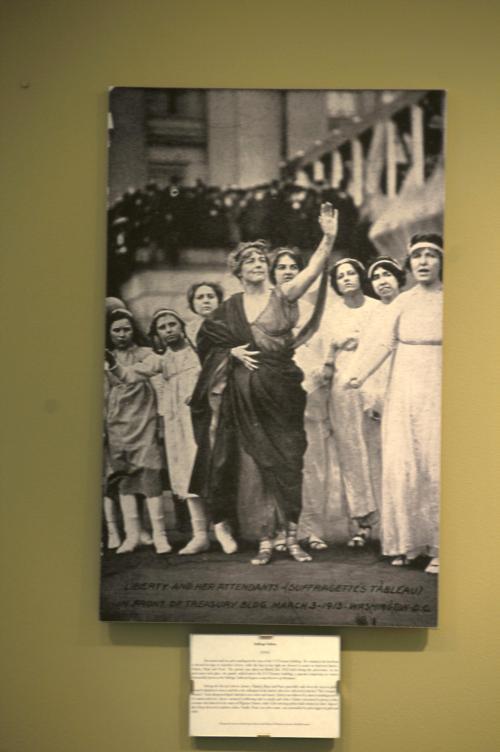Decades before Harvard students canvassed for Obama, Radcliffe women paraded the streets and distributed flyers door-to-door, demanding the right to vote. “Casting the First Ballot,” the fall exhibit at the Harvard College Women’s Center, draws together this struggle for suffrage with contemporary voter issues. Through reproductions of historical photographs and art by current Harvard students, “Casting the First Ballot” explores what it means to be a voter.
“We wanted to make historical conversation between past and present,” says Andres Castro Samayoa ’10, the student curator of the exhibit.
The historical photographs focus on the movement’s most iconic events. In one photograph, women surround a reinforced truck holding a replica of the Liberty Bell. The bell’s clapper has been fixed, a caption explains, so that the bell (and liberty) can only ring when women can vote. Suffragists drove the bell to every county in Pennsylvania, about 4,000 miles in total.
Such events were important in solidifying the movement. “The bell was one of the reasons people paid attention,” said Matthews K. Mmopi ’11, a student intern at the Center who helped Castro Samayoa organize the exhibit. “It wasn’t too out there, but it was enough to make a statement.”
Several pictures highlight the role of college women in the movement. In one, hundreds of women, crowded under Radcliffe and Wellesley banners, march down a New York street in a suffrage demonstration. These images link past activism with the current political atmosphere on campus. “It’s such an inspiration seeing people our age parading... being pro-active and so mature,” says Liz J. Powers ’10, one of the student artists featured in the exhibit. Her painting, “New Power,” conveys the rising optimism of women voters with bright colors in a simple folk style.
Castro Samayoa hoped to provide a forum for such creativity in organizing the exhibition. He says that at Harvard, “People are thinking and engaging with voting. People are voicing their opinions in classes and dining halls. We wanted to give another venue for people to express themselves artistically.”
Along the walls of the Center’s well-used rooms, student submissions alternate with the historical photographs to continue this dialogue. In the photograph “Rallying” by Jennifer J. Malin ’09, young voters crowd around at an Obama rally in Boston Common. “It parallels the activism that had been done in the college parades,” Castro Samayoa says.
“Your generation of people said, ‘This needs to change,’” said Susan B. Marine, the Director of the Women’s Center. “This is especially relevant to you all today,”.
Opening at the end of a long election season laden with talk of women and gender, “Casting the First Ballot” explores what it means to have the right to vote. “Engagement is not just about running for office,” Marine says. “It’s about understanding what it means to be involved in the voting process.”
Moreover, the exhibit urges its viewers not to take their votes for granted. “We need to realize that recently, over half the people on campus couldn’t vote. It’s a shocker,” Powers says.
By paralleling past and present political movements, the exhibit reinforces the importance of youth activism. “We’re in college. It’s our first real chance to get heard,” Mmopi says. “We need to remember that someone else made this freedom possible. Someone else invested in the mission and it paid off.”
Read more in Arts
College Musical: 'The Quad'













